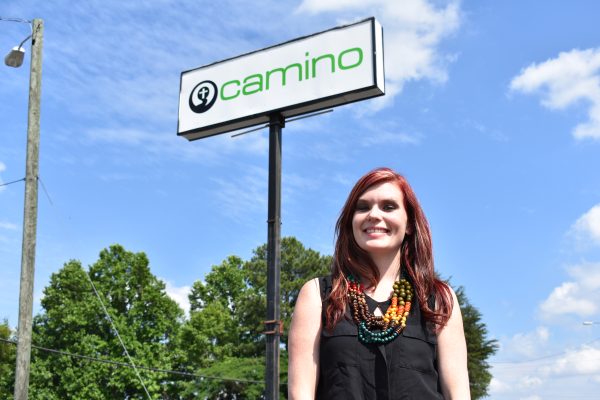Through Service to Others, Public Health Doctoral Student Discovers the Leader Within

Once in a while, you run across one of those people who, like a drop of water in a pool, creates ripples that affect everyone they touch.
Keri Revens is one of those people.
Keri is one of several Charlotte graduate students and faculty who, collectively, contribute more than 60 hours each week delivering counseling services to people at the Camino Community Center and Bethesda free clinic a few blocks west of UNC Charlotte’s main campus. Bethesda dispenses medical assistance to a client base comprising mostly non-English-speaking Latino immigrants.
But Keri doesn’t actually counsel anyone – she creates ripples.
“When I began at Camino, I could see we were helping a lot of people. But we didn’t have the data to prove it,” she said. “We couldn’t track the progress of our mental health program.” That’s where Keri saw a void she could fill.
Keri earned a bachelor’s degree in Health Education from Appalachian State and a master’s in Nutrition Physical Activity and Public Health from the University of Bristol, England. She is a Certified Health Education Specialist and has taught middle school and worked on projects in Nepal and Ecuador.
Pursuing her Ph.D. in public health sciences with a concentration in behavioral health with financial support from UNC Charlotte’s Graduate School, Keri’s work at Camino began last year when she learned there was a backlog of requests for counseling.
“When I first became involved, there were 85 mental health cases the clinic didn’t have the resources to work,” Keri said. Having experienced being alone in a foreign country, the needs of this immigrant community spoke to her.
“It’s a terrible feeling to be in a foreign land, need help, and find no one around who speaks your language,”Keri said.
The shortage of medical services is particularly acute in Charlotte’s Latino community. Low cost medical clinics are scarce and few counselors speak Spanish. The need is likely to grow as the number of immigrants who make Charlotte home continues to swell. Charlotte has one of the fastest growing Latino populations in the country, according to the Brookings Institution.
“We served 100 people in 2004; this year we will serve more than 20,000,” said Wendy Pascual, Camino Center Executive Director. “The health problems haven’t changed over time, but the diversity of ethnic groups and age have. “
“Keri’s contribution with the evaluation of our program helps us better understand the population we are serving — their needs and challenges,” she added. Pascual credits Keri with advancing Camino’s effectiveness and efficiency. “We have been able to improve the processes and tools we use to help our clients become an active agent in their own treatment. “
The first hint that Keri one day would assume a role like that at Camino was in her middle school teaching days. She found herself in the role of athletic director, a job focused more on accomplishing goals through others than on individual performance.
“That’s where I first began to understand the value of the administrative role in delivering services,” she said. She says the key is “having someone look across the entire effort and track our progress toward our goals.”
That became her mission; she spent that first summer identifying key performance factors typically used to measure progress in mental health treatment, such as percentage of kept appointments, counseling sessions per patient, and an assessment of patient symptoms and how those patients fared following treatment.
“My role became focused on demonstrating results and helping build support for our work,” she said.
Her first full year of tracking ended last December, and the effort, which the team labeled “Tu No Estas Solo (You are Not Alone),” achieved impressive results, thanks in large part to Keri’s contribution:
- In an industry where no-shows are common, 70% of scheduled appointments were kept;
- 66% of clients completed their prescribed treatment where dropping out after the first session is the norm;
- Symptoms of anxiety and depression improved noticeably and a majority of the client backlog disappeared.
Support is growing too. The Foundation for the Carolinas has provided support for a mental health program director, a donation from Blue Cross Blue Shield of North Carolina early this year will add health risk screenings and exercise programming services at Camino, and the mental health project is a finalist for funding from the Women’s Impact Fund, a Mecklenburg County non-profit organization.
The UNC Charlotte team led by Dr. Mark DeHaven directly supports the UNC Charlotte goal of achieving “community engagement with a focus on programs and partnerships that address the major needs of the Charlotte region.” Dr. DeHaven leads the Academy for Research on Community Health, Engagement and Services (ARCHES) that supports projects such as that at Camino.
“The relationship between UNC Charlotte and Camino provides a context for impactful community engagement, where the health needs of the community converge with the clinical expertise and training goals of the University,” DeHaven said. “In cases such as Keri’s, the student is able to hone her research and evaluation skills while addressing very real community needs in a way that really makes a difference in the lives of people in the University City community.”
Keri found her place in this important endeavor not by touching individual lives, but by putting in place a program, the ripples from which touch the lives of many.
To learn more about the public health Ph.D. program, visit its website or Graduate Admissions.